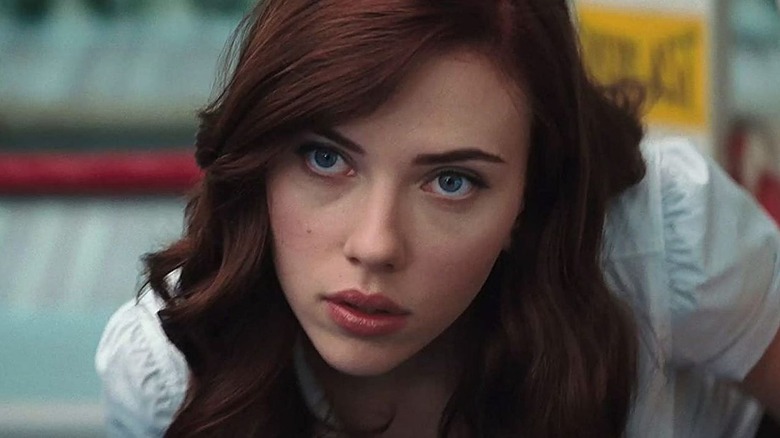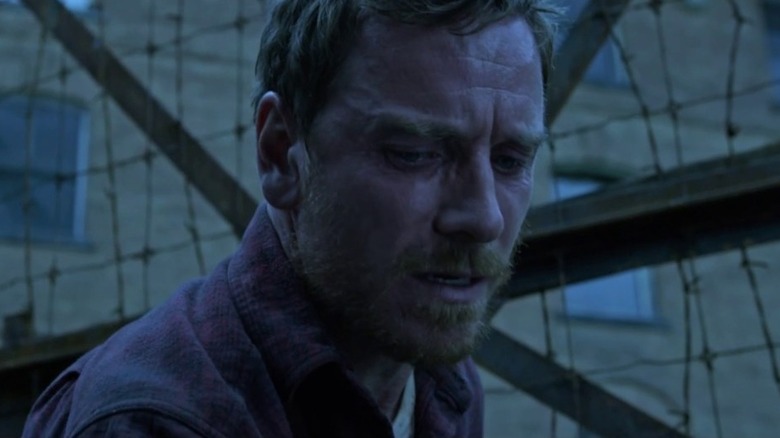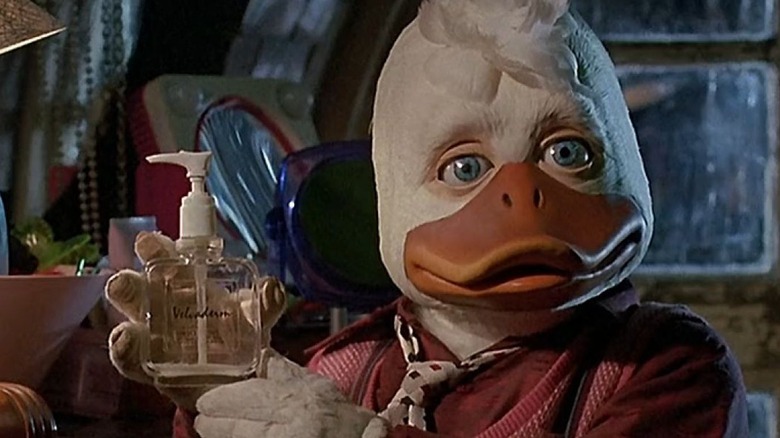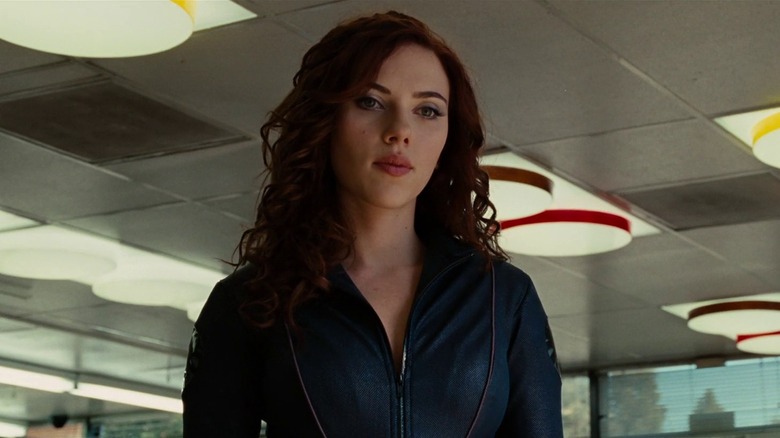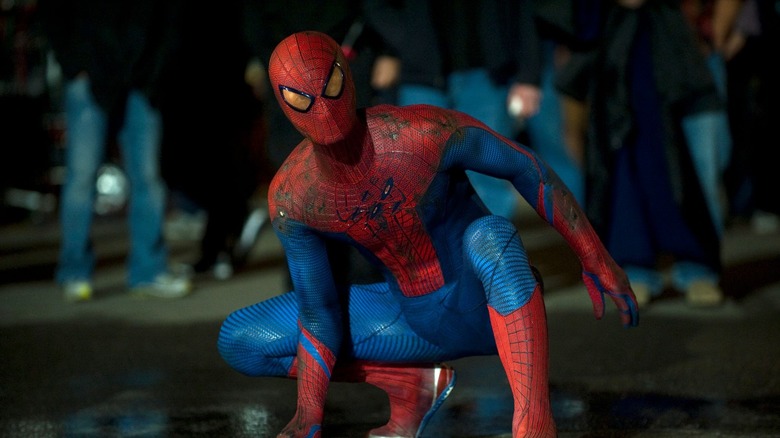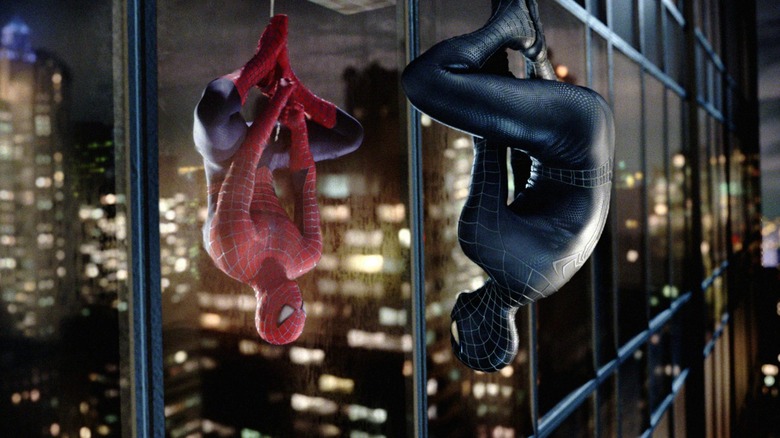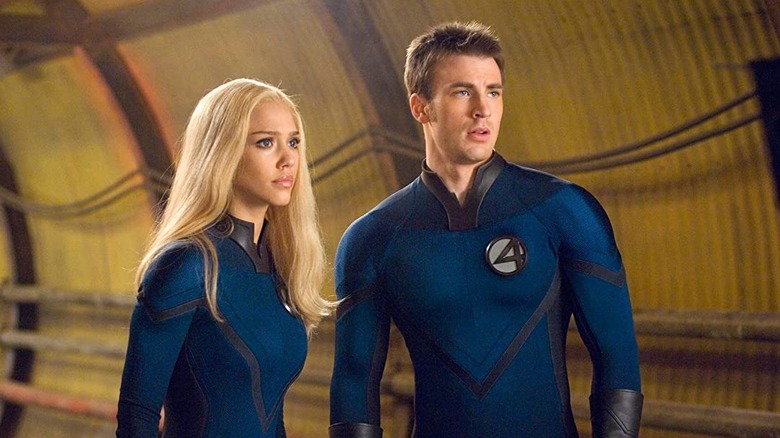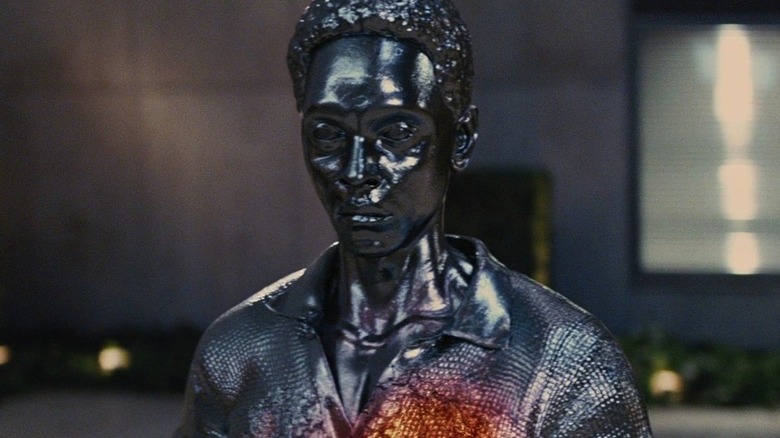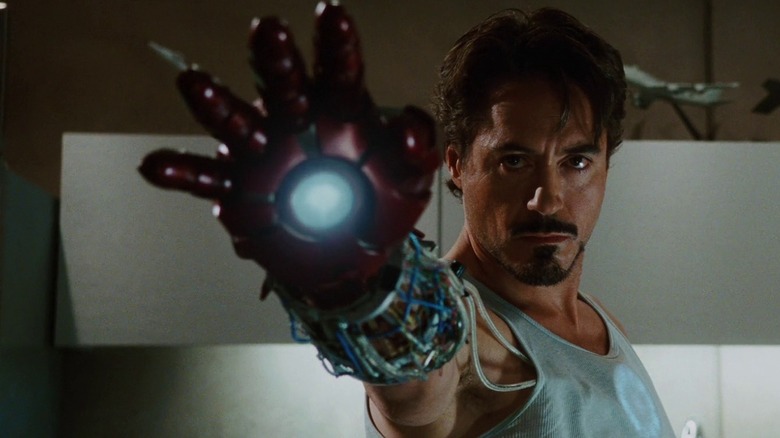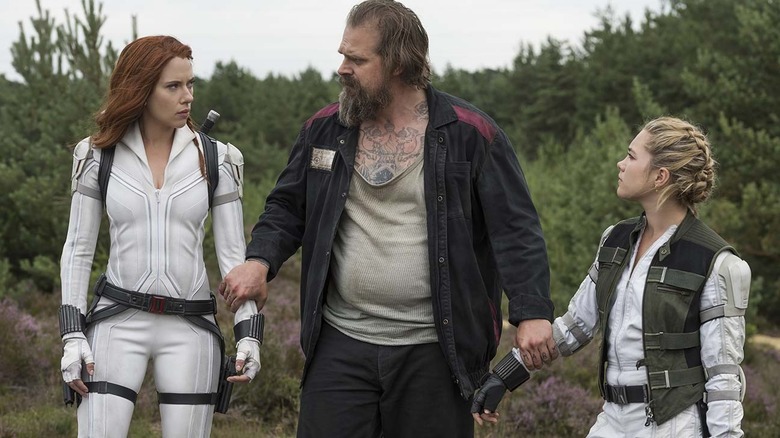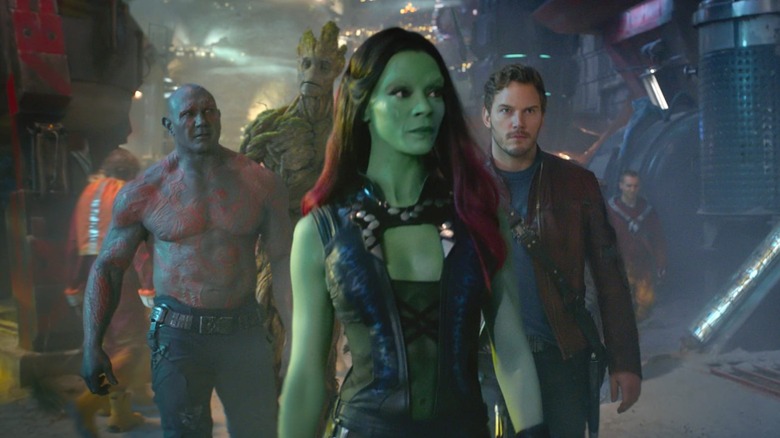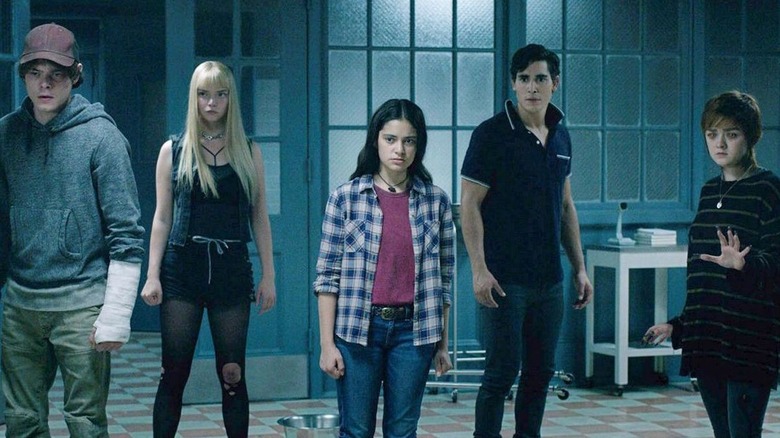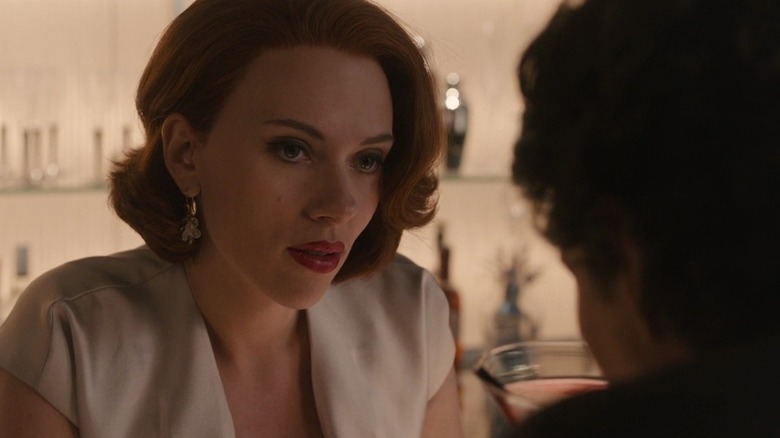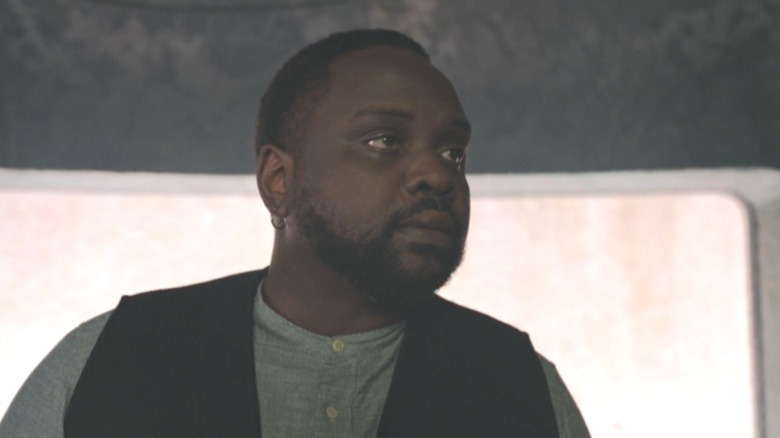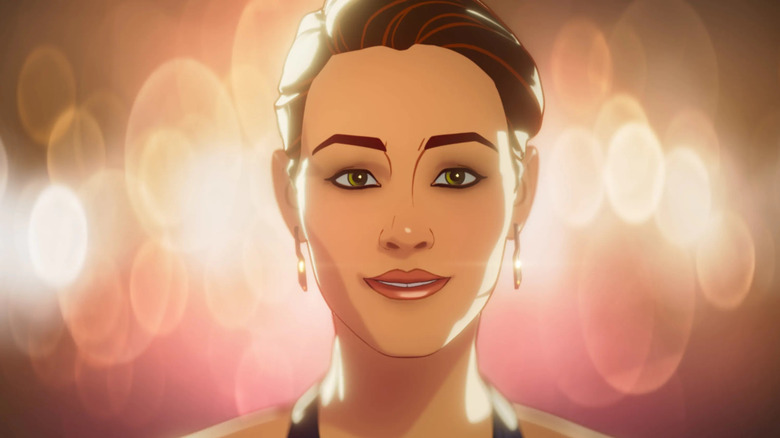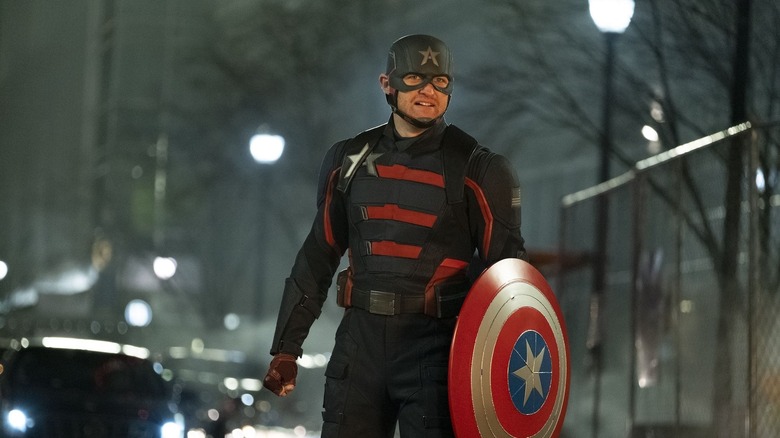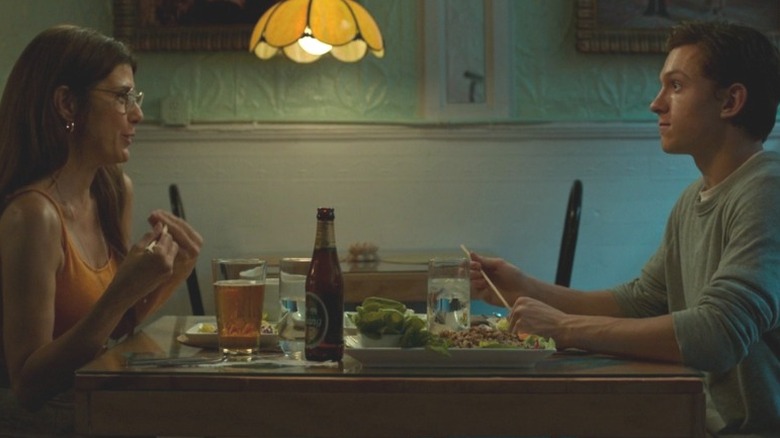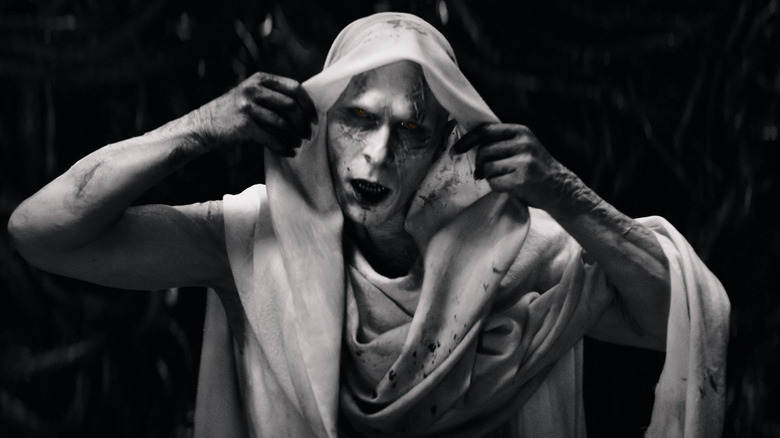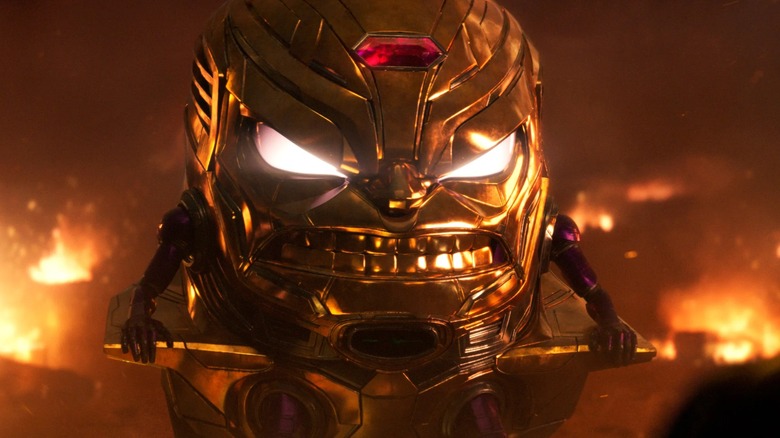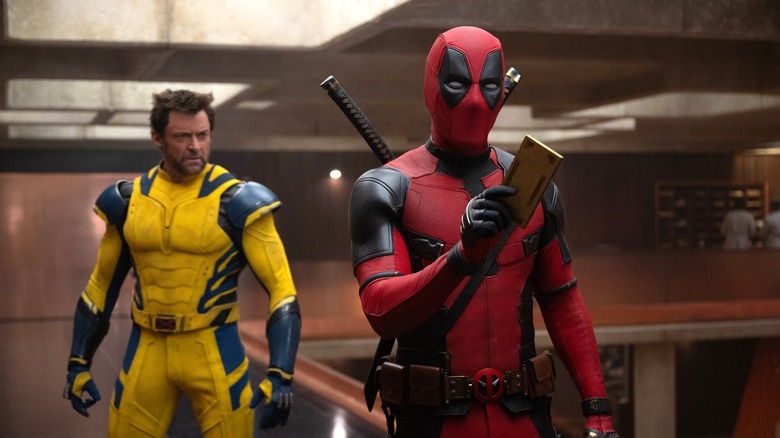Marvel Scenes That Went Too Far
Typically, mainstream superhero movies are meant to inspire rousing cheers, bursts of adrenaline, and even laughs from moviegoers. This is particularly true of features based on Marvel Comics, whose ranks include memorable crowd-pleasers like the original "Avengers" movie. But that doesn't mean every scene in a Marvel movie is guaranteed to leave you feeling satisfied or excited. Over multiple years of the franchise, several scenes have downright gone too far.
These scenes inspire the wrong kind of discomfort — the kind stemming not from subverting genre norms or dangling the dramatic possibility of universal annihilation, but from making problematic choices like objectifying actresses or punching down at marginalized populations. Nobody comes to an "X-Men" or "Guardians of the Galaxy" movie for that kind of nonsense.
Unfortunately, though, such scenes still crop up frequently in Marvel films. The superheroes in these movies beat many otherworldly challenges, but even they can't overcome the overwhelming discomfort stemming from these particularly troublesome moments.
X-Men: Apocalypse returning to Auschwitz
The opening of the original "X-Men" movie established the film franchise as something to be taken seriously, depicting an adolescent Erik Lehnsherr being separated from his parents at Auschwitz. It's a brutal sequence that's become so iconic that the "X-Men" franchise returned to it twice more. The first of these was in the 2011 prequel "X-Men: First Class," and the second was the 2016 entry "X-Men: Apocalypse," the latter of which proved as uncomfortable as the original sequence was impactful.
In "Apocalypse," the titular blue-skinned baddie (Oscar Isaac) takes Lehnsherr (a.k.a. Magneto), alongside his other evil minions, to the ruins of Auschwitz. Here, Apocalypse hopes to convince Magneto (Michael Fassbender) to join his plan to wipe out humanity. What made the presence of Auschwitz work in the original "X-Men" was how grounded in reality it was. Only the image of a young Lehnsherr somehow managing to bend a metal gate with his mind suggested the scene belonged to a sci-fi movie rather than a somber period piece. Going this understated route ensured that the scene didn't feel exploitative of a real tragedy.
In trying to establish grounding for Lehnsherr's character development in "Apocalypse," though, this particular movie falls into that exploitative pothole by depicting blue-skinned Oscar Isaac and Olivia Munn in a skintight blue bathing suit wandering around the ruins of a concentration camp. The dissonance between real-world horrors and the fantastical never gets reconciled, turning this into an uncomfortable callback to a classic and meaningful "X-Men" scene.
Howard and Beverly's intimate scene in Howard the Duck
Sometimes, superheroes need to take time off from punching villains and saving cats in trees to engage in more intimate affairs with the people they love. After all, even spandex-clad crusaders have a love life. Certain superhero movies, like "Iron Man" or "The Incredible Hulk," have explored the bedroom lives of their titular superheroes, but none have been as creepy about it as "Howard the Duck." Intimacy is a surprisingly common element in this PG-rated film, including Howard's brief stint working at a sauna full of human beings who can't keep their hands off each other. The film's fixation reaches its zenith of discomfort in a scene where the film's titular fowl gets cozy with a human woman.
The scene itself depicts Beverly (Lea Thompson) and Howard in bed together, with the former character engaging in sensual foreplay with the otherworldly fowl. At one point, Beverly purrs about Howard's irresistible "animal magnetism," causing a group of feathers on Howard's head to stand up. A visual metaphor for erections is not what you normally expect to see in a superhero movie. Though Beverly is meant to be joshing with Howard (to a degree), the close connection between the two characters still makes this an incredibly awkward scene to sit through. It wouldn't necessarily be a bad idea for more superhero movies to be conscious of intimacy, but not like this. Anything but this.
Black Widow's introduction in Iron Man 2
Some MCU superheroes, like Spider-Man or Black Panther, get truly unforgettable introductory scenes even before we see them in action. Natasha Romanoff, aka Black Widow (Scarlett Johansson), unfortunately, got a far more uncomfortable debut. In "Iron Man 2," Natasha enters the story posing as Natalie Rushman, a candidate for Tony Stark's (Robert Downey Jr.) new assistant position. After she introduces herself, Stark Googles Natalie, his search bringing up scantily-clad modeling photos. He zooms in on these images as he and Pepper Potts (Gwyneth Paltrow) discuss Rushman's qualifications for the job.
Immediately after the introduction, Natasha beats Happy Hogan (Jon Favreau) in a boxing match. Seeing this physical display right after the modeling photos prompts Tony to quip to Pepper, just after Natasha leaves the room, "I want one." It's a squirm-inducing moment that plays off Tony's unhealthy habit of objectifying every woman he sees, while also reducing Natasha to being just eye candy for Stark and the audience.
This method of introducing one of the members of the first Avengers line-up proved so thoughtless that even Scarlett Johansson has critiqued the scene. Calling it an example of hyper-sexualization, Johansson also noted that later portrayals of Black Widow have attempted to correct the norms established in this disappointing "Iron Man 2" scene.
Spider-stalking in The Amazing Spider-Man 2
Different movie versions of Spider-Man each bring their own interpretations of the web-crawler. The second installment of Marc Webb's take on the seminal superhero, "The Amazing Spider-Man 2," reveals this iteration of the character to be ... a stalker.
Peter Parker (Andrew Garfield), after remembering a promise he made to the now-deceased George Stacy (Denis Leary), decides to cut girlfriend Gwen Stacy (Emma Stone) out of his dangerous superhero life. But this isn't the end of Parker's influence over his ex: He proceeds to watch over an oblivious Gwen while in his Spider-Man disguise. Though Gwen later asks Peter if he's been stalking her, it's immediately played off as a cutesy moment, and neither the film nor Gwen make a big fuss out of this possessive behavior.
Peter's penchant for stalking is emblematic of a lot of problems in this incarnation of "Spider-Man." Chief among these issues is how the "Amazing Spider-Man" films treat the women in Peter's life like objects, not people, while Peter behaves in abrasively unpleasant ways. Peter has always been a flawed person prone to mistakes (it's how Uncle Ben perished, after all), but the best instances of this foible are relatable shortcomings and opportunities for growth, not aggressive acts of stalking.
Abusive behavior in Spider-Man 3
"Spider-Man 3" has a lot of admirable elements competing against some truly baffling choices. A rushed third act where Venom and Sandman abruptly join forces, for example, reduces both characters to CGI boss villains rather than more fleshed-out individuals. Perhaps the most uncomfortable of the film's shortcomings, though, comes at the end of a scene where Peter Parker (Tobey Maguire), manipulated by the Venom symbiote to act on his most wicked urges, takes Gwen Stacy (Bryce Dallas Howard) out dancing to make Mary Jane Watson (Kirsten Dunst) jealous.
This scene ends with Peter slapping Mary Jane, a moment that's played as deadly serious and the culmination of Peter being out of control and at the whim of his worst impulses. However, "Spider-Man 3" never fully grasps the ramifications of this example of abusive behavior. Even if it's manipulated by a cosmic goo-creature, it's too heavy for a light-hearted superhero movie to effectively engage with.
This scene goes too far in establishing just how fueled by anger Peter has become, and it even has adverse ripple effects on the rest of the plot. The fact that Mary Jane Watson eventually becomes a damsel-in-distress for Peter in the climax only adds insult to injury: "Spider-Man 3" just wants to wrap things up with a traditional "Spider-Man" finale while ignoring the extremely disconcerting behavior that's unquestionably altered its status quo.
Naked Susan Storm in Fantastic Four: Rise of the Silver Surfer
Susan Storm has often gotten the short shrift as a character no matter what form the Fantastic Four team takes. So it's no surprise that this trend extended to both of the Tim Story-directed "Fantastic Four" movies, where the character was played by Jessica Alba. In these films, Susan is primarily on hand to be ogled by the camera rather than treated as a compelling superhero, an issue that's especially prominent in "Fantastic Four: Rise of the Silver Surfer."
A key example of this comes midway through the movie, where shenanigans involving Susan and Johnny Storm (Chris Evans) swapping powers conclude with Susan sprawled naked on a New York street. The onlookers gawk at Susan before she even realizes what's happening. Once she does, she immediately turns invisible and asks aloud, "Why does this always happen to me?"
It's an awkward bit of comedy that's clumsily executed in terms of timing, but it's also botched in terms of reducing this character to eye candy for characters and moviegoers to stare at. This immensely uncomfortable "Rise of the Silver Surfer" scene furthers poor Susan Storm's dismal track record of getting taken advantage of by her media.
Darwin's death in X-Men: First Class
In "X-Men: First Class," Charles Xavier (James McAvoy) and Erik Lehnsherr recruit a collection of young, outcast mutants to serve as the first group of students they'll teach and guide. Among these youngsters is Armando Muñoz, aka Darwin (Edi Gathegi), a mutant with the ability to adapt to any environment, like growing gills when he's underwater. It's an impressive power, and one can imagine this gift would prove useful in "First Class" and its sequels. Unfortunately, Darwin never gets the chance to appear in any follow-ups. Once the "First Class" baddie Sebastian Shaw (Kevin Bacon) shows up, Darwin becomes the one member of the group who perishes at his hand.
This moment is already puzzling because it goes against Darwin's entire powerset. Shouldn't a mutant who can adapt to anything be able to survive Shaw tossing some kinetic energy down his throat? But it's extra problematic considering that the only good-guy mutant who bites the dust in "X-Men: First Class" is a Black character, an upsetting development pointed out after the film's initial theatrical release. On top of that, the "X-Men" movies as a whole never made much time for Black characters and their perspectives — making the demise of Darwin a truly troubling scene in this prequel.
Iron Man's transphobic joke
The inaugural entry in the MCU, "Iron Man," boasts a view of women that was already retrograde back in 2008. Ladies largely appear in this movie to wear skimpy outfits and entertain Tony Stark. The crass billionaire is in clear need of sensitivity training, a fact made especially evident when Stark makes trans women the butt of a hurtful joke during a visit with his buddy James "Rhodey" Rhodes (Terrence Howard). As Rhodey is giving a speech to new pilots, Tony interrupts to regale everyone with a tale about "the time [Rhodey] guessed wrong. It's spring break, just remember that. Spring break 1987, that lovely lady, what was his name? Was it Ivan?"
The whole joke evokes a worn-out, toxic bit involving straight, cisgender men having sexual encounters with women and subsequently discovering they're trans, a gag also seen in projects like "Dude, Where's My Car?" or "The Hangover: Part II." One can't even excuse the line by saying it's an example of "Iron Man" depicting its protagonist as a flawed person. Not only does the transphobic joke come after Tony returns from the Middle East to improve his life, but the execution of the line makes it apparent the audience is supposed to laugh at it like the new pilots do, not see it as a problem. The MCU has always come up woefully short on LGBTQIA+ representation, but this instance of transphobia is one of the most uncomfortable examples of the trend.
The jokes about Red Guardian's weight in Black Widow
There isn't a lot of body diversity across the individual films in the Marvel Cinematic Universe, with everyone from bodyguards to superheroes to scientists looking like uber-muscular models. But there are exceptions, like the "Black Widow" character Alexei Shostakov aka Red Guardian (David Harbour). The surrogate father figure to Natasha Romanoff and Yelena Belova (Florence Pugh), "Black Widow" introduces present-day Shostakov as a middle-aged man who spent a long stint in a Russian prison. During this time, he's apparently gained a significant amount of weight, a fact that "Black Widow" keeps harping on for the sake of a low-effort gag.
"Black Widow" repeatedly brings up Shostakov's weight as a punchline, including an extended scene of him struggling to slip into his old Red Guardian outfit. Such jokes are so ubiquitous in the film that one even served as the final gag in the initial "Black Widow" teaser. The moments centered on Shostakov's weight aren't just uncomfortable, they also undercut one of the central messages of "Black Widow." A recurring theme in this film is accepting others despite their differences, which even extends to one of the story's villains, Taskmaster. Unfortunately, the film does not extend this same level of acceptance to fat people. In a franchise with such a limited view of what human bodies can look like, it's a shame "Black Widow" resorted to uncomfortable and stale jokes like these.
Drax calling Gamora a 'green w****' in Guardians of the Galaxy
In the climax of "Guardians of the Galaxy," Drax (Dave Bautista) celebrates the fact that he's finally become friends with his fellow cosmic teammates by listing how everyone on the team, even "this dumb tree," is his pal. This extends to Gamora (Zoe Saldana), whom he labels a "green w****," much to her annoyance. This is a set-up for the next gag, involving Nebula (Karen Gillan) suddenly appearing and insulting Gamora, only for Drax to blast her away because "nobody talks to my friends like that." (Except him, of course.)
While meant to help establish how close Drax has become to the titular Guardians, there's no getting around the fact that using the word "w****" as an insult to the only woman among your main characters is degrading to Gamora. It's also a confusing line from the ever-literal Drax who, up to this point, seems like a character whose vocabulary wouldn't include schoolyard insults.
The "joke" was meant to reference the fact that people had called Gamora a "w****" in the Kyln space prison, and that Drax innocently assumes this is the proper term to use when talking to her. However, in execution, it seems unnecessary and just serves as an uncomfortable distraction during an otherwise exhilarating finale.
Magik being racist in The New Mutants
When "The New Mutants" protagonist Danielle "Dani" Moonstar (Blu Hunt) arrives at a facility for teenage mutants struggling with their powers, she's greeted by Illyana Rasputin aka Magik (Anya Taylor-Joy). This Russian mutant proceeds to bombard Dani with a barrage of racist insults linked to her Indigenous heritage, including calling her "Standing Rock" and "Pocahontas."
It's already staggeringly tone-deaf to have the first Indigenous character headlining a live-action Marvel Comics film adaptation endure such racist behavior onscreen. However, it's extra baffling since the movie doesn't seem to have an awareness of how grotesque this behavior is. The arc of the story involves Magik going from being a reclusive person who shuts everyone out (like new recruit Dani) to being more open to working with others.
By the end of the movie, Magik is a generic superhero we're supposed to cheer on blindly, but neither she nor the film ever confront her racist behavior. Surely there is a less toxic way to demonstrate Magik's baseline demeanor in "The New Mutants" than to inflict racist treatment on Dani, who is so much more than a casualty of Magik's character development. Going this route simply clouds any potential joy in seeing the titular characters of "The New Mutants" finally working together.
Black Widow's 'monster' line in Avengers: Age of Ultron
In a scene between Black Widow and Hulk midway through 2015's "Avengers: Age of Ultron," Natasha Romanoff attempts to get close to Bruce Banner (Mark Ruffalo), only for the latter character to rebuff her advances. As Bruce tells her, thanks to his transformations into the Hulk, there's no way he can have a normal life, including having kids. This is when Natasha drops a bombshell: She can't have kids, either. As part of her training to be an assassin, her teachers sterilized her so she couldn't have children and develop emotional attachments that would compromise her skills as a killer.
"Still think you're the only monster on the team?" Natasha then inquires of Bruce. The underlying intent of the scene may have been to show that Natasha being trained solely to murder people — and violated horrifically in the process — means that Banner isn't the only one with gruesome parts of his past to deal with. However, in execution, the editing and dialogue here seem to be pointing to Natasha's inability to have kids as the part of her personality that makes her a monster.
It's a clumsily orchestrated scene in many ways, not least because of writer-director Joss Whedon's baffling decision to make fertility a crucial part of the backstory of the (at that point) only female Avenger. This all-around uncomfortable scene didn't enhance Black Widow's character, but diminished her to her reproductive capacities — and reminded viewers just how badly MCU movies often fumble their handling of women.
The Eternals Hiroshima scene
Each of the titular Eternals has a unique reason for staying solo in the modern world. While some are movie stars and others are ranchers, Phastos (Brian Tyree Henry) has been reeling from disillusionment with humanity. While he now has a husband and kid, viewers see a flashback showing that Phastos was left convinced humanity was "not worth saving" after witnessing the carnage unleashed by the bombing of Hiroshima.
Phastos, the person responsible for giving humanity the tools to develop everything from plows to bombs, has become devastated by witnessing the horrors humanity is capable of. This scene is meant to provide contrast with the happy domestic life Phastos has found in the modern world, given how many Americans still don't reckon with the horrific consequences of the bombing.
However, this scene garnered controversy for invoking the horrors of Hiroshima in the context of a superhero movie that features big alien monsters and comical Kumail Nanjiani lines. The absence of Japanese perspectives in this scene also inspired criticism, with the implicit intention of this scene being that the Hiroshima bombing only had value in terms of how it impacted this one Eternal. "Eternals" grappled with weightier material than your average Marvel Studios title, but this Hiroshima scene demonstrated an instance where its thematic reach exceeded its grasp.
Christine Palmer's multiple death scenes in What If...?
One episode of the first season of "What If....?," entitled "What If... Doctor Strange Lost His Heart Instead of His Hands?," drastically reimagines the moment Doctor Strange (Benedict Cumberbatch) loses the use of his hands in a car crash. In this context, that same crash does not cost Strange his hands, but instead costs him his love interest, Christine Palmer (Rachel McAdams).
In this dimension, Strange turns to the magic arts in the hopes of reviving Palmer. One outcome of this scenario involves a variant of Strange turning to darker forms of sorcery after constantly failing to save Palmer via time travel. As one could imagine, there are no happy endings when somebody like Strange is repeatedly fiddling with saving those who cannot be saved.
This installment of "What If...?" had its share of fans, but the repeated moments where Palmer perishes drew a decidedly more negative reception. There was widespread frustration over this plot being a lengthy excuse to engage in fridging, the practice of killing a female character to motivate a male protagonist. Others also expressed disappointment over the MCU's continued inability to give Palmer a substantive role or perspective. Even with the limitless multiverse at its disposal, the folks behind "What If...?" indulge in a storytelling hallmark that many saw as going too far.
The redemption of John Walker in The Falcon and the Winter Soldier
Throughout "The Falcon and the Winter Soldier," John Walker (Wyatt Russell) is an intriguing antagonistic figure. The U.S. government's pick to take over the Captain America mantle, Walker is a square-jawed military veteran who has no problem doing what his commanding officers say, without even blinking at the consequences. This puts him into stark contrast with the personality of Sam Wilson/The Falcon (Anthony Mackie), with the two character's differences even being reflected in subtle details about their ethnicities.
For example, while Wilson is accosted by white cops before they realize he's an Avenger, Walker is later shown fiddling around with a police car's siren. A potential life-and-death scenario for Wilson is just a toy for Walker. Their differences culminate in a moment where Walker slaughters an unarmed Flag-Smashers follower, a malicious act that indicates Walker has crossed the line into overt villainy.
However, the finale for "The Falcon and the Winter Soldier" frustratingly erases these developments. Walker shows up to the big climactic battle with a homemade Captain America shield and, after initially displaying some aggression, just becomes another friendly ally to the show's titular superheroes. He's even shown cracking quips with Bucky Barnes (Sebastian Stan) about Abraham Lincoln. It's a moment that betrays the initial darker elements of the character and proved to be understandably controversial.
Aunt May's fate in Spider-Man: No Way Home
The MCU version of Aunt May (Marisa Tomei) bids farewell to moviegoers in 2021's "Spider-Man: No Way Home," after she perishes while trying to help her superhero nephew fight the Green Goblin (Willem Dafoe). Just before her passing, May imparts some important wisdom to Peter Parker (Tom Holland), informing him that "with great power comes great responsibility." A line stemming from Uncle Ben in every other incarnation of Spider-Man, this moment solidifies that, though Aunt May is gone, her impact on Spider-Man will go on and on.
For some, this twist on the norms of Spider-Man mythology combined with the poignancy of her passing was enough to make this one of the more emotionally satisfying moments in all of "No Way Home." However, others thought the demise of Aunt May went too far for all the wrong reasons. Specifically, a recurring sentiment was that having Aunt May perish in this manner was a disappointing culmination of the character — one who arguably got little of substance to do in the MCU Spider-Man movies, which some critics said reduced her to a simple plot device.
While the passing of Aunt May brought some to tears, others found it to be a discouraging development that continued familiar storytelling tendencies, rather than bringing something truly fresh to this iteration of Spider-Man.
The child soldier scene in Thor: Love and Thunder
The classical fairy tale impulses of "Thor: Love and Thunder" are rarely clearer than when Gorr the God Butcher (Christian Bale) kidnaps a slew of Asgardian children as part of his evil plot. Eventually, the heroic Thor (Chris Hemsworth) comes to the aid of these youngsters and uses Zeus's thunderbolt to give these kidnapped adolescents superpowers. They then join Thor and Jane Foster (Natalie Portman) in an epic battle against Gorr and his CG minions.
It's supposed to be a deeply cathartic sequence reinforcing how often writer-director Taika Waititi returns to adolescent characters in works like "Jojo Rabbit" and "Hunt for the Wilderpeople." In execution, however, it's a deeply peculiar sequence, especially since the visual imagery of the scene equates the youngsters to adult soldiers charging into battle rather than a "Home Alone" protagonist taking prankish revenge on intruders.
Turning these kidnapped youngsters into basically fantastical child soldiers is a profoundly uncomfortable decision, especially since the crowded third act of "Love and Thunder" doesn't offer any opportunity for either the in-universe characters or viewers to really grapple with the consequences. These super-powered youngsters quickly vanish from the screen so that Thor, Jane, and Gorr can focus on encountering Eternity. Conceptually, it's easy to see why Waititi and company thought giving kids the power of the Gods would be a crowdpleasing moment. But onscreen, it's a weird sequence that asks us to root for children slaughtering people.
M.O.D.O.K's death scene in Quantumania
Some MCU sequences go too far because of inappropriate or dated material. But a key scene in "Ant-Man and the Wasp: Quantumania" qualifies specifically because it combines unnerving imagery with unearned stabs at sentimentality. This is M.O.D.O.K./Darren Cross's big death scene, after he sacrifices himself to save Scott Lang (Paul Rudd) and friends. As Cross lies dying, he remarks, "At least I became an Avenger," an outcome that never actually happens. Lang and comrades just nod at these final words as the former villain passes away.
Beloved comic book adversary M.O.D.O.K. came to the silver screen looking absolutely hideous, with an emphasis on "realism" leaving actor Corey Stoll's head stretched out too weirdly and entering the uncanny valley. The innately repellant look of the character makes this critical "Quantumania" sequence, intended to leave audiences sniffling, merely puzzling. An attempt to inject some comedy into this death scene, through M.O.D.O.K. believing he'd become an Avenger, also registers as incredibly miscalculated.
As if M.O.D.O.K'.s character design wasn't enough to make the scene fall apart, the script also can't resist cramming in one more underwhelming joke. But above all else, it's just impossible to feel any emotion beyond disgust gazing at this hideous incarnation of M.O.D.O.K. The "Quantumania" creative team's combination of unearned treacle and this character design makes a sequence that really does go too far in all the worst ways.
A string of homophobic jokes in Deadpool and Wolverine
"Deadpool and Wolverine" didn't just bring Ryan Reynolds and his Deadpool character to the MCU. It also ensured that gay panic jokes were back in season in this franchise. All throughout "Deadpool and Wolverine," Deadpool makes jokes about men grabbing his butt, Wolverine's private parts, and a final joke about how that's "what Scoutmaster Kevin used to say" when another character informs the film's leads that she's going to show them "something huge." The problem here isn't the "offensiveness" of the lines. It's how derivative they are. Such tired, yawn-worthy "haha gay" gags feel cribbed from the era of "Without a Paddle," and "Wild Hogs," and not fresh humor for 2024 audiences.
The whole point of Deadpool is that he's an unpredictable whirlwind of chaos. That goes out the window when he's spouting all these gay panic jokes that have been done to death. If you're going to make jokes involving LGBTQIA+ people, make them visually and conceptually creative. Don't just embrace the same standard lines and jokes bro-comedies rehashed to death decades ago.
It doesn't help that these jokes followed up a slew of "Deadpool and Wolverine" posters that also found the very idea of men holding hands or dancing together "hysterical." This team-up superhero film lacked creativity in many respects. That was especially true with the film's gay panic gags, which just reeked of lazy comedic impulses.
